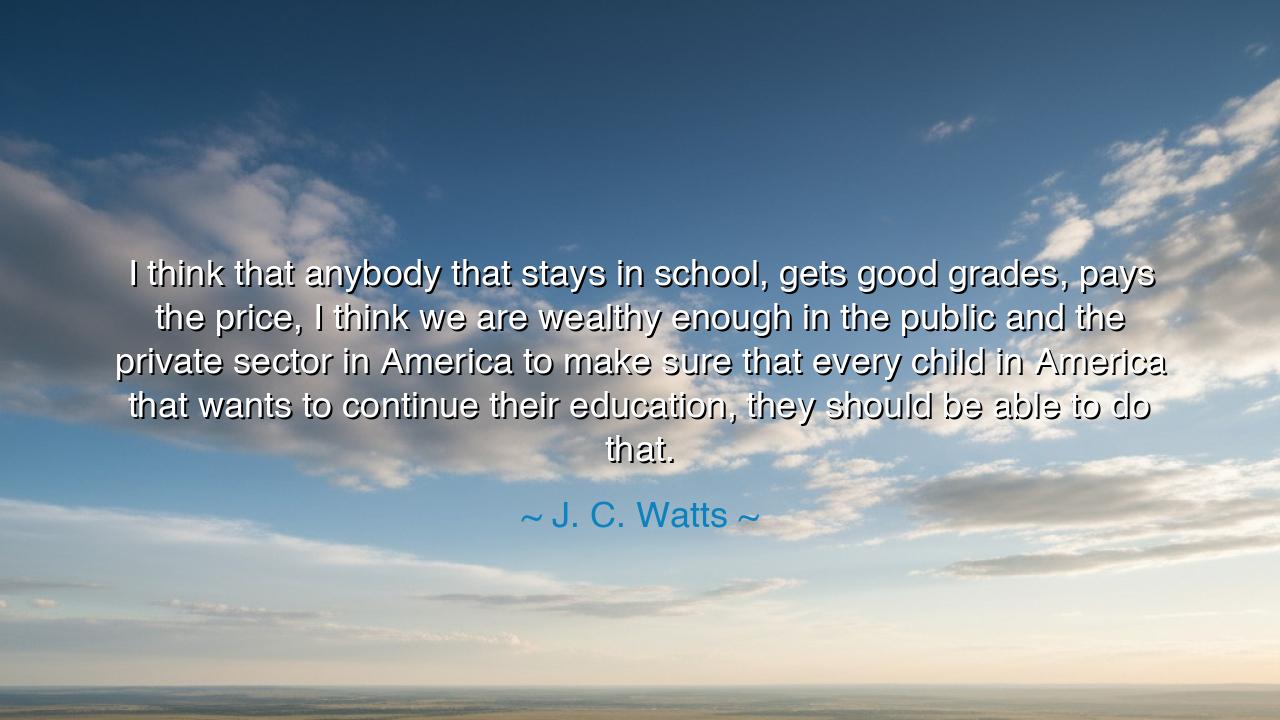
I think that anybody that stays in school, gets good grades, pays
I think that anybody that stays in school, gets good grades, pays the price, I think we are wealthy enough in the public and the private sector in America to make sure that every child in America that wants to continue their education, they should be able to do that.






“I think that anybody that stays in school, gets good grades, pays the price, I think we are wealthy enough in the public and the private sector in America to make sure that every child in America that wants to continue their education, they should be able to do that.” Thus spoke J. C. Watts, a statesman of conviction and former congressman, whose words rise like a call across the generations — a call to justice, to responsibility, and to faith in the promise of education. In this declaration, Watts speaks not only of policy, but of principle. He envisions a nation where every child, regardless of their birth or circumstance, can climb the ladder of knowledge — where diligence and perseverance, not privilege, determine destiny.
Watts’ words spring from the soil of American experience, where education has long been the great equalizer, the forge in which common men and women shape their own futures. When he says, “stays in school, gets good grades, pays the price,” he honors the timeless virtues of discipline, sacrifice, and faith in effort. For he reminds us that opportunity is not a gift but a covenant — that a society can only lift its children if they, too, are willing to strive, to endure, to earn their place in the sun. Yet, his vision does not stop with the individual. Watts calls upon the nation itself — both public and private — to uphold its end of the covenant: to ensure that no dream dies for lack of means, and that the doors of education remain open to all who would walk through them.
In the ancient world, the wise understood that education is the breath of civilization. The philosopher Confucius taught that the strength of a nation lies in the moral and intellectual cultivation of its people. The Greeks built their academies not for the few, but for the training of free citizens, for they knew that democracy could not survive ignorance. Likewise, Watts echoes this eternal truth: that a people who neglect the minds of their children are a people preparing their own decline. To educate one child is to strengthen a nation; to deny that child is to dim the light of the future.
Consider, for example, the story of Booker T. Washington, born into slavery, yet rising by the power of learning to become one of the greatest educators in American history. He believed, as Watts does, that education was both the path to freedom and the duty of a free society. When Washington founded the Tuskegee Institute, he built it not upon wealth or prestige, but upon the labor and will of his students — young men and women who “paid the price” through hard work and perseverance. Their hands built their classrooms; their hunger for knowledge built their future. In them, we see the truth of Watts’ words: that when a society supports the willing and honors the diligent, it builds more than schools — it builds character, community, and hope.
Watts’ statement also carries a deep moral weight. To say that America is “wealthy enough” is not merely an economic claim, but a moral one. It is an appeal to conscience — a reminder that abundance is meaningless if it is not shared in the service of humanity. The measure of a nation’s greatness is not found in its riches, but in how it invests those riches — whether it builds towers of luxury or bridges of learning. The wealth of a society must nourish the spirit as well as the body, and education is that nourishment: the food of the mind, the fire that kindles the heart.
And yet, Watts’ vision is not one of charity, but of empowerment. He does not speak of pitying the poor or granting favors to the few, but of empowering every child to fulfill their potential through effort and support. His words are a reminder that a truly just society lifts all by opening the path of learning to all — for when one child rises, so too does the nation. Education is not an expense, but an investment in the future, the seed from which innovation, justice, and peace will grow.
So, my children, take this teaching to heart: stay in school, strive for excellence, and never shrink from the price of learning. Let your pursuit of knowledge be your act of faith — faith in yourself, and in the promise that no effort is in vain. And for those who lead, who hold wealth, power, or influence — let Watts’ words be your guide. Use your strength to lift others, that the circle of opportunity may be unbroken. For the destiny of a people is written not in the stones of their monuments, but in the minds of their children.
Thus, remember: a nation that believes in education for all believes in its own soul. If we, as a people, ensure that every child who “stays in school, gets good grades, and pays the price” can continue their journey, then we fulfill not only the dream of Watts, but the promise of America itself — that through knowledge, effort, and unity, the light of opportunity shall shine for all who seek it.






AAdministratorAdministrator
Welcome, honored guests. Please leave a comment, we will respond soon